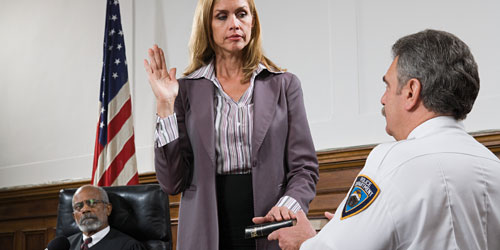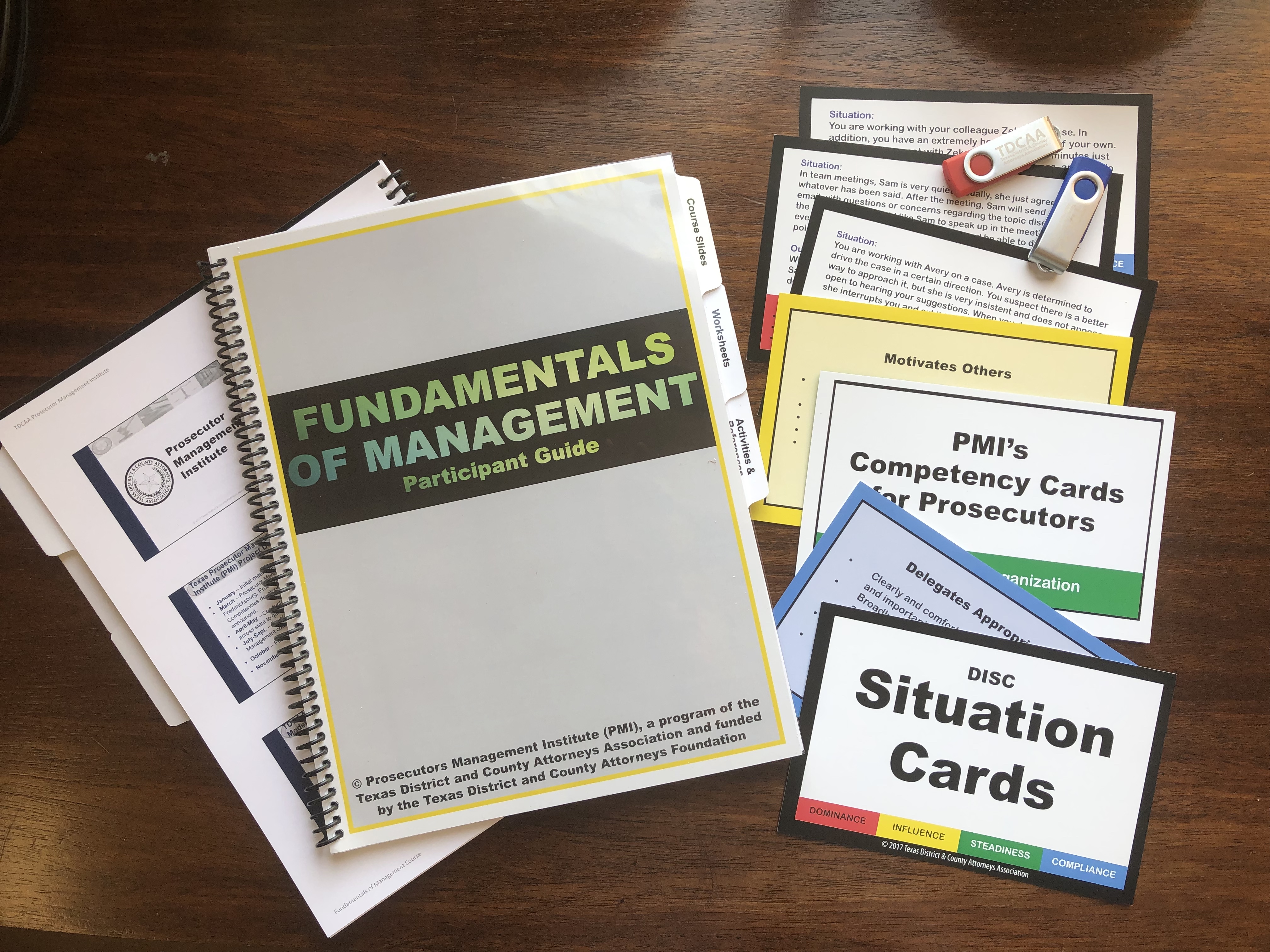The property tax revenue cap “emergency” bill lacks the votes to make it to the floor of the Senate, the new secretary of state’s appointment is about to be rejected by the Senate Nominations Committee, and there’s still no agreement on how to fix school finance. If this is supposed to be the “Kumbaya Session,” we’d hate to see what it looks like when they aren’t supposedly getting along so famously.
Judicial branch pay issues
Members of TDCAA’s Legislative Committee convened in Austin this week to discuss various funding and pay issues that you are going to have to deal with this session. As a result of their deliberations, a delegation of elected prosecutors intends to bring their concerns to State Sen. Joan Huffman (R-Houston), author of the bill that would give some (but not all) judges—and no elected prosecutors—a pay raise (SB 387, discussed in further detail here).
We will share with you the outcome of that meeting after it has taken place, along with any recommendations based on those developments. We recognize how important these matters are to you, so if events necessitate a mid-week update from us, we will do so. Until then, please continue to talk to your local judges and neighboring prosecutors about your concerns, and please share with us here in Austin any new information you learn.
SCOTUS issues opinion on asset forfeiture?
OK, that’s not really what Timbs v. Indiana was about, we just wanted to grab your attention. In truth, this was a rather esoteric constitutional law decision about the 8th and 14th Amendments that arose in the context of an asset forfeiture case. You can read today’s case summaries to learn the ins and outs of that ruling, but due to some erroneous reporting about the case in the media, we feel obligated to note in this space that the Timbs decision does not change the law in Texas. Unlike some other states (such as Indiana), our appellate courts have been willing to apply the Excessive Fines Clause of the 8th Amendment to asset forfeiture cases for the past two decades (if not longer). While Timbs could lead to more of those types of challenges due to the attention the case has garnered in some quarters, it’s nothing new or dramatic for Texas jurisprudence, so feel free to share that background with anyone who asks you about this topic.
Scattershots
Here are some stories and articles we don’t have time to summarize, but they might be of interest to some of you:
- Death penalty reform bill lands Republican joint authors (Texas Tribune)
- Gangs, lack of guards trigger riots at TJJD facility (Houston Chronicle)
- Senator Paxton files bill to give General Paxton regulatory authority over securities regulations he is accused of violating (Texas Tribune)
- Study: Vaping pot yields more powerful high than smoking it (NBC News)
- Courts struggle to interpret emojis (The Verge)
Floor action
Bills on issues designated as an “emergency” are now reaching the Senate floor, as SB 10 by Nelson (R-Flower Mound) to create a Texas Mental Health Care Consortium is on the Senate calendar for Monday. (Not on that calendar is SB 2, the property tax reform bill, which currently lacks the votes it needs to be considered under the Senate’s three-fifths rule.) It will be several weeks before any non-emergency items can be debated on the House or Senate floor, but take this as yet another sign that the legislature is about to get to work in earnest.
Committee hearings
Each week we will try to provide you with notice of relevant bills being heard in various committees. Due to space limitations, we won’t always list all the bills posted for a hearing, but you can click on the underlined hyperlink in the committee name for a full listing of each notice, including bill information (such as the actual text of a proposal) that can be accessed by clicking on any bill number posted there.
Monday, February 25
House International Relations & Economic Development – 10:00 a.m. in Room E2.014
- HB 48 by M. Gonzalez requiring prosecutors to report wage theft convictions to a state registry
House Criminal Jurisprudence – 2:00 p.m. in Room E2.012
- HB 51 by Canales mandating certain standardized forms for criminal actions statewide
- HB 93 by Canales requiring a magistrate’s name on certain signed orders
- HB 98 by M. Gonzalez revising the revenge porn statute after Ex Parte Jones
- HB 101 by Canales creating the criminal offense of false caller ID display
- HB 226 by Krause creating a commission to review penal laws outside the Penal Code
- HB 595 by Rosenthal increasing the penalty for false report hate crimes
Wednesday, February 27
House Homeland Security & Public Safety – 8:00 a.m. in Room E2.016
- HB 162 by White shortening or repealing the period of DL suspensions for various offenses
- HB 238 by Krause prohibiting the enforcement of federal firearm regulations in Texas
- HB 302 by Paul banning certain property owners from restricting the carrying of firearms
- HB 364 by Tinderholt creating a statewide database of ignition interlock users
Remember, TDCAA is not going to testify for or against these bills. To steal someone else’s slogan: “We report, you decide.” And if no one shows up at the committee hearing but then complains about what the committee did, we will steal someone else’s slogan: “Where’s the beef??!” Remember, the legislative process is like some raffles: You must be present to win. If you want to learn more about a bill and find out how to get involved for or against it—or even just get us to stop recycling lame ad jingles from decades past—contact Shannon for details.
New bills to watch
We are now tracking 789 (25% percent) of the 3,191 bills filed through Wednesday of this week. Here is another list highlighting some of the more interesting bills filed in the past few days:
- HB 1871 by Goldman, expanding public access to juvenile court proceedings
- HB 1936 by Rose, excluding persons with “severe mental illness” from the death penalty
- HB 1955 by Dutton, mandating release on personal bond for most misdemeanors
- HB 1961 by Moody, making it a crime to make a false report to a jailer or correctional officer
- HB 1992 by Leman, prohibiting telemarketers from using misleading caller ID information
- HB 1996 by Leman, requiring immigration admonitions to be given orally and in writing
- HB 2015 by Dutton, regulating searches, seizures, and raids by SWAT teams
- HB 2026 by Collier, creating an optional “wobbler” penalty for certain state jail felonies
- HB 2049 by Collier, expanding factors indicating a lack of consent to sexual assault
- HB 2120 by Leach, the omnibus judicial branch and court creation bill
- HB 2134 by Klick, restricting the use of certain physicians in certain child abuse investigations
- SB 887 by Menendez, prohibiting a “gay panic” defense and authorizing anti-bigotry instructions
- SB 891 by Huffman, the omnibus judicial branch and court creation bill
To read any bill, go to https://capitol.texas.gov/, enter the bill number in the appropriate field, and click “go”—then on the subsequent webpage, select the tab at the top of the page for the information (history, bill text, actions, authors, etc.) you want. And as always, you can contact Shannon or Rob if you are having trouble finding the information you seek.
Next week
We’re still waiting for bills to drop (that’s Capitol lingo for “be filed”) on a variety of topics that may be of interest to you, including state jail felonies, civil asset forfeiture, the death penalty, and grand juries. Even though bill filings seem to be slower this session, there will still be two or three thousand more bills filed over the next two weeks ahead of the 60-day deadline (March 8), so we’ll review them all and be sure to find the needles in that haystack for you. Bill-filing will be the primary focus of legislators of legislators for two more weeks, but as that winds down, the focus will turn to committee hearings. Remember, these committee hearings are the single biggest “choke point” in the legislative process: Approval by a committee often translates into a bill ending up on the governor’s desk, while defeat in a committee leads to almost-certain death. (Good luck if you want to pass some new laws!)
Legislative rotation sign-up
If you are interested in coming to Austin this session, please contact Shannon for details on how to get involved. We have several slots available for prosecutors to come to Austin and help craft the laws and appropriations that directly impact you, so check your calendar and find a good time to come to hang out with us.
Domestic Violence Seminar
Registration is now open for TDCAA’s 2019 Domestic Violence Seminar. Whether you are new to prosecution or a seasoned hand, this course will cover practical skills you need to do your job today. From intake to advocacy, this is domestic violence training developed for Texas prosecutors and presented by Texas prosecutors. Join us in Georgetown, Texas, from April 9th to the 12th for this exciting training opportunity. For more information, please click here.
Quotes of the Week
“The no-knock warrants are going to go away like leaded gasoline in this city.”
Houston Police Chief Art Acevedo, in response to a no-knock drug bust by HPD that went horribly awry, resulting in two civilian deaths and multiple injured officers—including some who may now face criminal charges themselves.
“In the House, we recognize that we’re going to be the adults in the room. We’re going to come up with pragmatic and thoughtful policy—and we won’t react to the artificial deadlines set by the Senate.”
State Rep. Trey Martinez-Fischer (D-San Antonio), member of the House Ways & Means Committee that will consider legislation to lower local revenue caps.
“Well, y’know, time is just time. I’m here to turn myself in.”
Former State Sen. Carlos Uresti (D-San Antonio), outside the federal courthouse where he turned himself in to start serving his 12-year federal prison sentence for various fraud and corruption-related charges.
“Really, when you’re looking at trying to keep a community safe, safety is not a Democrat or a Republican issue. It’s an issue of common sense. Democrats want to keep our streets safe just like Republicans do. So, everyone is doing their part in my administration to ensure the safety of this community.”
Bexar County Criminal DA Joe Gonzalez (D), who has hired several recently-defeated local Republican judges to serve in his new administration.



